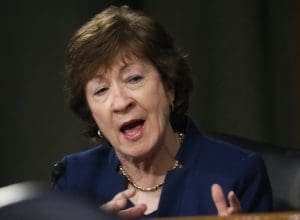15 times Trump proved Susan Collins wrong since she said he learned his lesson
His impeachment acquittal has only emboldened him to disregard norms and ethics.

As she announced that she would vote to acquit Donald Trump on all impeachment charges in February, Sen. Susan Collins (R-ME) said she believed he had learned a “pretty big lesson” from the case and would “be much more cautious in the future.”
Since that time, Trump has repeatedly demonstrated that she was wrong.
Here are 15 examples:
1. Trump said he learned nothing
Days after Collins’ prediction, Trump was directly asked by a reporter on Feb. 12, “What lessons did you learn from impeachment?”
“That the Democrats are crooked,” he replied. “They’re vicious. That they shouldn’t have brought impeachment.”
Asked that day what specific lesson Trump had learned, Collins refused to name any.
2. Trump retaliated against Lt. Col. Alexander Vindman
On Feb. 7, Trump ousted the National Security Council’s top Ukraine expert, Lt. Col. Alexander Vindman, from his White House position, reassigning the Purple Heart recipient to the Pentagon. Vindman had testified that he did not think it was “proper” that Trump demanded a foreign government investigate his political rivals.
Though Collins had earlier said she was “not in favor of any kind of retribution against anyone who came forward with evidence,” neither she nor any GOP colleagues defended Vindman publicly.
3. Trump retaliated against Ambassador Gordon Sondland
The same day Vindman was removed, Trump also fired his ambassador to the European Union, Gordon Sondland. Sondland, like Vindman, had been a key impeachment witness, contradicting Trump’s repeated claims that there had been no “quid pro quo” in his demands of an investigation into the Bidens in exchange for the security aid to Ukraine already approved by Congress.
4. Trump demoted Vindman’s twin brother
On the same day Alexander Vindman was ousted, his twin brother, Lt. Col. Yevgeny Vindman, was also removed from his job on the National Security Council and reassigned to the Army. While he was not an impeachment witness, his demotion appeared to be another act of retaliation against his brother.
5. The administration backtracked on its sentencing recommendation for Roger Stone
On Feb. 11, after Trump tweeted that a recommended sentence for his longtime friend and former campaign adviser Roger Stone was a “miscarriage of justice,” the Justice Department overruled its career prosecutors and reduced Stone’s recommended sentence.
Stone had been convicted in November of witness tampering and obstruction of justice that was discovered during the Russia investigation.
Collins said she did not think Trump should have “gotten involved” in the matter of Stone’s sentencing.
6. The administration dropped charges against Russian firms indicted in Robert Mueller’s probe
On March 16, the Justice Department moved to drop charges against two Russian shell corporations indicted in Robert Mueller’s investigation into meddling in the 2016 election. Though they had been accused of conspiring to defraud the United States, DOJ prosecutors determined it was “no longer in the best interests of justice or the country’s national security to continue this prosecution.”
7. Trump fired the inspector general for the intelligence community
On April 3, Trump fired Michael Atkinson, the inspector general for the intelligence community. Atkinson said he had followed federal law last year when he forwarded an anonymous whistleblower complaint to Congress about Trump’s pressuring of Ukraine to investigate his political rivals.
Trump said Atkinson was a “disgrace” who had done “a terrible job,” complaining that Atkinson had not “requested to see me” before transmitting the complaint.
Collins released a statement that said, “While I recognize that the President has the authority to appoint and remove Inspectors General, I believe Inspector General Atkinson served the Intelligence Community and the American people well, and his removal was not warranted.”
8. Trump fired the acting inspector general for the Pentagon
On April 7, Trump fired Glenn Fine, the acting inspector general for the Department of Defense. Fine had been leading the Pandemic Response Accountability Committee, created to oversee the administration’s implementation of the $2 trillion Coronavirus Aid, Relief, and Economic Security (CARES) Act.
Trump said he did not trust him to be unbiased because he had worked for the Obama administration.
9. Trump might have illegally added his name to stimulus checks
On April 14, the Washington Post reported that the Treasury Department had ordered Trump’s name be added to stimulus checks being sent to Americans in response to the COVID-19 pandemic, a move that some officials said could delay their delivery.
Three well-known lawyers wrote to the Justice Department urging an investigation into whether the “gratuitous placement of Mr. Trump’s signature on the memo line” of the checks was a “political activity” in violation of the Hatch Act. They suggested Trump might have illegally directed a federal employee “to enable his piggybacking on CARES checks to further his re-election campaign.”
10. The administration demoted a public health whistleblower for doing his job
On April 22, Dr. Rick Bright, who had headed the federal agency overseeing the development of a coronavirus vaccine, said he had been removed from his position. His crime: He pushed for a full examination of the safety and efficacy of an anti-malarial drug Trump has repeatedly touted as a “miracle” cure for COVID-19. Several studies have shown the medication is not an effective treatment for the virus and might actually cause harm.
Trump later smeared Bright as a “fake” whistleblower and tweeted, “This whole Whistleblower racket needs to be looked at very closely, it is causing great injustice & harm,” tagging Collins in his tweet. Collins responded by saying her earlier critical comments about Trump firings of inspectors general had nothing to do with Bright’s removal.
11. Trump removed the acting inspector general for Health and Human Services
On May 2, Trump removed the acting inspector general for the Department of Health and Human Services, Christi Grimm. Her office had released a report documenting a “severe shortage of testing supplies” for the coronavirus at American hospitals, contradicting Trump’s boasts about testing. Trump had claimed testing was “perfect” and available to anyone who wanted it.” Trump had attacked Grimm, insisting that because she had served under the Obama administration, her report could not be trusted and was “”Another Fake Dossier!” Grimm did serve under the Obama administration, and before that, under the George W. Bush administration.
12. The Justice Department dropped its prosecution of Michael Flynn even after he pleaded guilty
On May 7, the Justice Department announced it would drop its criminal case against Trump’s first national security adviser, Michael Flynn. Flynn, another figure charged in Mueller’s Russia investigation, had pleaded guilty to lying to the FBI.
“What happened to General Michael Flynn, a war hero, should never be allowed to happen to a citizen of the United States again!” Trump had tweeted days earlier, claiming that Flynn had somehow been set up by investigators. Trump said in 2017 that he had fired Flynn for lying to the FBI and to Vice President Mike Pence.
13. Trump fired the State Department’s inspector general
On May 15, Trump fired Steve Linick, inspector general for the State Department, saying he’d done so at the request of Secretary of State Mike Pompeo. Linick had reportedly been investigating Pompeo’s use of government staffers for personal errands. Trump dismissed those allegations on Monday, saying they were not “important.”
Collins tweeted over the weekend that Trump had “not provided the kind of justification for the removal” of Linick that is required by federal law.
14. Trump removed the Transportation Department’s acting inspector general
Also on May 15, Trump demoted acting Transportation Department inspector general Mitch Behm. Behm was reportedly investigating whether Transportation Secretary Elaine Chao had given improper special treatment to Kentucky. Chao’s husband is Kentucky Sen. Mitch McConnell.
15. Trump threatened states’ funding over letting people vote
On Wednesday, Trump threatened to block federal aid to Michigan and Nevada after the states took actions to make it easier for citizens to vote by mail during the pandemic. He accused the swing states of sending “illegal” vote-by-mail ballots to citizens. Trump has repeatedly opposed making it easy for people to vote from home because it “doesn’t work out well for Republicans.”
Collins’ office did not respond to an inquiry for this story.
Published with permission of The American Independent Foundation.
Recommended

Assisted living home lawsuit, citations add to controversy over Hovde’s nursing home remarks
Campaign says GOP Senate hopeful has no responsibility for facility and lawsuit lacks merit
By Erik Gunn, Wisconsin Examiner - April 24, 2024
Democrat Lucas Kunce’s fundraising surge could be a game changer for Missouri Senate race
Kunce’s opponent, incumbent Sen. Josh Hawley, has staunch anti-abortion views that could jeopardize his reelection bid.
By Jesse Valentine - April 18, 2024
Republican Eric Hovde’s company exposed workers to hazardous chemical
Employees were put at risk to develop asthma or chronic bronchitis.
By Jesse Valentine - April 12, 2024







































































